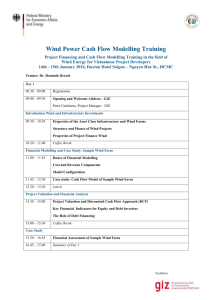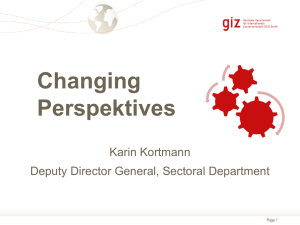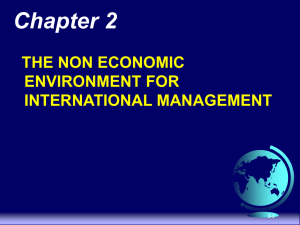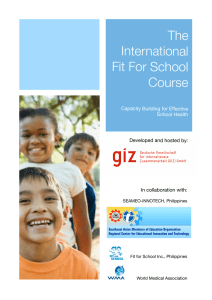Fit for School Fact Sheet
advertisement
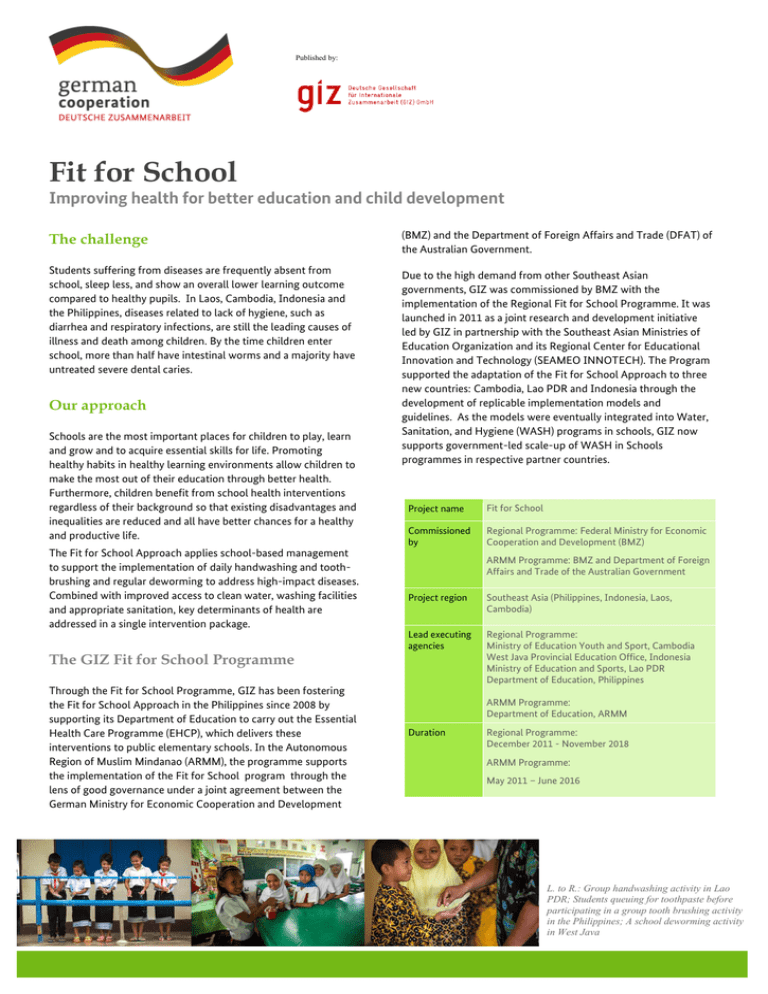
Published by: Fit for School Improving health for better education and child development The challenge (BMZ) and the Department of Foreign Affairs and Trade (DFAT) of the Australian Government. Students suffering from diseases are frequently absent from school, sleep less, and show an overall lower learning outcome compared to healthy pupils. In Laos, Cambodia, Indonesia and the Philippines, diseases related to lack of hygiene, such as diarrhea and respiratory infections, are still the leading causes of illness and death among children. By the time children enter school, more than half have intestinal worms and a majority have untreated severe dental caries. Due to the high demand from other Southeast Asian governments, GIZ was commissioned by BMZ with the implementation of the Regional Fit for School Programme. It was launched in 2011 as a joint research and development initiative led by GIZ in partnership with the Southeast Asian Ministries of Education Organization and its Regional Center for Educational Innovation and Technology (SEAMEO INNOTECH). The Program supported the adaptation of the Fit for School Approach to three new countries: Cambodia, Lao PDR and Indonesia through the development of replicable implementation models and guidelines. As the models were eventually integrated into Water, Sanitation, and Hygiene (WASH) programs in schools, GIZ now supports government-led scale-up of WASH in Schools programmes in respective partner countries. Our approach Schools are the most important places for children to play, learn and grow and to acquire essential skills for life. Promoting healthy habits in healthy learning environments allow children to make the most out of their education through better health. Furthermore, children benefit from school health interventions regardless of their background so that existing disadvantages and inequalities are reduced and all have better chances for a healthy and productive life. The Fit for School Approach applies school-based management to support the implementation of daily handwashing and toothbrushing and regular deworming to address high-impact diseases. Combined with improved access to clean water, washing facilities and appropriate sanitation, key determinants of health are addressed in a single intervention package. The GIZ Fit for School Programme Through the Fit for School Programme, GIZ has been fostering the Fit for School Approach in the Philippines since 2008 by supporting its Department of Education to carry out the Essential Health Care Programme (EHCP), which delivers these interventions to public elementary schools. In the Autonomous Region of Muslim Mindanao (ARMM), the programme supports the implementation of the Fit for School program through the lens of good governance under a joint agreement between the German Ministry for Economic Cooperation and Development Project name Fit for School Commissioned by Regional Programme: Federal Ministry for Economic Cooperation and Development (BMZ) ARMM Programme: BMZ and Department of Foreign Affairs and Trade of the Australian Government Project region Southeast Asia (Philippines, Indonesia, Laos, Cambodia) Lead executing agencies Regional Programme: Ministry of Education Youth and Sport, Cambodia West Java Provincial Education Office, Indonesia Ministry of Education and Sports, Lao PDR Department of Education, Philippines ARMM Programme: Department of Education, ARMM Duration Regional Programme: December 2011 - November 2018 ARMM Programme: May 2011 – June 2016 L. to R.: Group handwashing activity in Lao PDR; Students queuing for toothpaste before participating in a group tooth brushing activity in the Philippines; A school deworming activity in West Java Fotos: © Programmea PROEFA Your benefits In the Philippines, what began as a GIZ-supported project piloting the Fit for School Approach in one province in 2008 now targets more than 2.5 million public elementary school children in 40 provinces under the EHCP. Through the model schools, the Regional Programme benefited between 5,000 to 8,000 children per country in Cambodia, Lao PDR and Indonesia. Confident with their own experience in implementation, government partners in the respective countries have since led the scale up to more schools and localities. A longitudinal health outcome study measured the impact of the interventions in the Philippines and has shown very positive health effects after just one year: 20 percent less underweight children, 30 percent less absenteeism, 40 percent less infections from decayed teeth and 50 percent less heavy worm infections compared to schools employing traditional health education. The same study was conducted in the Cambodia, Lao PDR and Indonesia and resulted in better access to WASH facilities, improved practice of handwashing with soap among students, and prevented the incidence of new caries cases by 20 percent. School-based management Recognizing School-based Management (SBM) as an important cornerstone, the Fit for School Approach strengthens the capacity of the education sector to manage WinS and open the doors of schools for close collaboration with the larger school community and parents. Every member of the community can contribute in various important ways to make the program successful including the construction of washing facilities, participation in monitoring or cleaning, repair and maintenance. In this way, even schools with very limited resources can start to improve the school environment step by step and implement simple but effective health interventions. Success factors Simple, sustainable, scalable, and systems thinking The Fit for School Approach is based on four core principles: simplicity, sustainability, scalability and systems thinking. A school health program and its interventions must be based on best possible evidence, should be cost-effective and simplified to facilitate implementation in the school context with little extra effort. To ensure sustainability, long-term allocation of government human and financial resources is crucial. A close partnership with the parents and local community is imperative in maximizing ownership and accountability. Capitalizing existing systems and resources are essential elements for scalability. The approach works through the education sector, especially on sub-national level, in order to establish sustainable programme management and implementation within the local structures. Additional payments and monetary incentives are not part of the approach since this often leads to a collapse of activities as soon as the external funding ends. Published by Christine Sangkula, division nurse from Tawi-Tawi, says “EHCP has paved the way for a better and healthier school environment through the concerted efforts of the nurse, teachers, parents and the community with the active participation of school children. Closely working with them makes my task easier to spread the word about WASH in schools and preventive hygiene measures. Thus, I believe that my work gains a more significant meaning than just lecturing and treating children individually. We nurses can truly make a difference for the health of the school children." On behalf of Federal Ministry for Economic Cooperation and Development (BMZ) Offices registered in Bonn and Eschborn, Germany Division Policy Issues of Multilateral Development Policy Addresses of the BMZ offices BMZ Bonn Dahlmannstraße 4 53133 Bonn, Germany T +49 (0)228 99 535-0 F +49 (0)228 99 535-3500 poststelle@bmz.bund.de www.bmz.de Author Dr. Bella Monse As at January 2016 Photos: © GIZ Fit for School The Department of Education in the Autonomous Region in Muslim Mindanao (DepEd ARMM) implements the Essential Health Care Program (EHCP) in 400 schools in the region. Deutsche Gesellschaft für Internationale Zusammenarbeit (GIZ) GmbH Fit for School Programme 7th Floor PDCP Bank Centre, Salcedo Village, Makati, Philippines T +63 2 6515173/4/5 bella.monse@giz.de www.fitforschool.international In cooperation with Success story BMZ Berlin Stresemannstraße 94 10963 Berlin, Germany T +49 (0) 30 18 535-0 F +49 (0) 30 18 535-2501 GIZ is responsible for the content of this publication.
